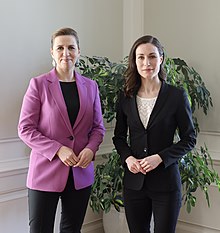Mette Frederiksen
The second woman to hold either office, she is also the youngest prime minister in Danish history, the first to be born after Margrethe II's accession to the throne, and the first to serve under Frederik X.
Frederiksen was subsequently commissioned by Queen Margrethe II to lead negotiations to form a new government, and was sworn in as prime minister on 27 June.
[8] On 13 December 2022, Frederiksen announced that an accord on a coalition government with the Social Democrats, the Venstre and the Moderates had been reached, with herself continuing as prime minister.
[14] Under Frederiksen's leadership after the 2015 general election in which the Social Democrats returned to power and gained three seats in the Folketing, the party has moved back to the left on economic issues while taking a conservative stance on immigration.
[15][16] The 2019 general election saw the Social Democrats gaining a further seat while support for the Danish People's Party and the Liberal Alliance collapsed, costing Lars Løkke Rasmussen his majority.
[19][20][21] At a press conference on 4 November 2020, Mette Frederiksen stated that the government had decided that all mink in Denmark should be killed due to the risk of infection with COVID-19.
The report stated that Frederiksen's statements at the press conference on 4 November 2020 were "objectively grossly misleading", but that she was not aware of the illegality of the order to kill all mink.
[25][26] The Red-Green Alliance and Green Left, both of which are supporting parties of Frederiksen, announced they would not be voting for independent lawyer examination of the report, which could lead to impeachment.
[33] Later the same day, Nielsen announced that she was ready to put forward a motion of no confidence if the prime minister refused to call early elections.
[46] On 20 August 2019, Trump cancelled the state visit, scheduled 2–3 September 2019, with specific reference to Frederiksen's refusal to discuss a possible sale.
[50] At the request of the United States,[51] Frederiksen initiated diplomatic talks in early 2022 on the possible presence of American troops on Danish soil.
[66] Frederiksen travelled to London and Brussels to discuss the leaks with British Prime Minister Liz Truss, President of the European Council Charles Michel and NATO Secretary General Jens Stoltenberg.
She reiterated to all she spoke with that there is a need for increased surveillance of critical infrastructure and that they must take Russian President Vladimir Putin's threats seriously.
The model aims to solve the issue of ethnic and economic disparity and "parallel society tendencies" between gymnasiums by considering parent income.
[83] Frederiksen became increasingly sceptical of mass immigration, as she believes it has had negative impacts for much of the population, a more pressing issue since at least 2001 after the September 11 attacks which intensified during the 2015 European migrant crisis.
In a biography, Frederiksen stated: "For me, it is becoming increasingly clear that the price of unregulated globalization, mass immigration, and the free movement of labour is paid for by the lower classes.
"[15][16] Under Frederiksen, the Social Democrats voted in favour of a law allowing Danish authorities to confiscate money, jewellery, and other valuable items from refugees crossing the border.
[84] The bill received harsh condemnation from the United Nations Human Rights Council,[85] and widespread comparisons between the plan and the treatment of Jews in Nazi-occupied Europe.
[15] Frederiksen also backed the right-wing populist Danish People's Party in their paradigm shift push to make repatriation, rather than integration, the goal of asylum policy.
[88] The Danish state subsequently ceased the renewal of temporary residency permits to about 189 Syrian refugees, claiming that it is "now safe to return to Syria".
[citation needed] She has argued that the perception of the Social Democrats adopting the Third Way and practicing centrist, neoliberal economics and supporting unrestricted globalisation contributed to the party's poor electoral performance in the early 21st century.
Labeling economic foreign policies of Europe as too liberal, Frederiksen has criticised other social democratic parties for losing their voters' trust by failing to prevent globalisation's chipping away of labour rights, increasing inequality and uncontrolled immigration.
[15] Frederiksen's government made international news with the agreement to reduce Denmark's territorial emissions by 70% in 2030 compared to 1990,[91] the decision to stop oil and gas exploration after 2050[92][93] (also driven by the fact that only one company applied for a lease in the latest auction[94]), and the energy islands in the North Sea.
[116] Similarly, her government has been criticised[117] for allowing state-owned companies to continue the build-out of fossil fuel infrastructure like a natural gas pipeline of 115 km, with an associated socio-economic cost of $113 million for Denmark.
[118] In a formal answer to the Parliament, the Minister of Climate Dan Jørgensen confirmed that the gas pipeline would not reduce the carbon emissions in the short term nor add any jobs in Denmark.
In February 2021, the Danish Council on Climate found it was not likely that Frederiksen's government would achieve their original target of a 70% reduction of greenhouse gases by 2030.
[121] Frederiksen responded to the criticism by saying that her opinion on private education had become more nuanced since her remarks in 2005 and that it would have been hypocritical of her to put her own political career ahead of her daughter's best interest.
[123] According to Ekstra Bladet, on 5 December 2012, the Ministry of Employment had new figures for how many people were expected to lose the right to unemployment benefits on 1 January 2013 and the following six months.
[126] Her government endured criticism in 2020 and 2021 for refusing to repatriate children with Danish citizenship from Syrian refugee camps in Kurdish-controlled Syria, due to their parents having joined the Islamic State.
[131] On 7 August 2024, Frederiksen's attacker was convicted by the Copenhagen District Court and sentenced to four months imprisonment, deportation and a ban from entering Denmark for six years following his release.





